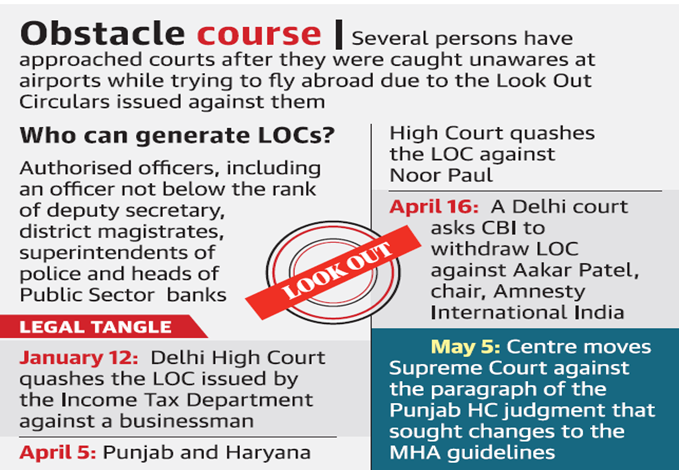In News:
- A series of recent court orders have put emphasis on the opaque and mechanical manner in which look-out circulars (LOCs) are generated.
- Despite the fact that the opaque system is such that a person will not know if such a circular exists against him or her until they arrive at the airport, the Union Home Ministry is not about to back down.
What’s in today’s article:
- Look-out circulars
- About
- How and who can issue an LOC?
- Rules to issue an LoC and its validity
- Does an LOC lead to arrest?
- Legal position
- Interpol notices v. LOC
- News Summary
Look-out circulars (LOCs):
- About:
- An LOC is issued to make sure that an individual who is absconding or wanted by law enforcement agencies is not able to leave the country.
- It is mostly used at immigration checkpoints at international airports and seaports by the immigration branch.
- How and who can issue an LOC?
- In India, it can be issued by the Ministry of Home Affairs and by various authorities for keeping a watch on arrival or departure of Indians and foreigners.
- These authorities include the Ministry of External Affairs, the Customs and Income Tax Departments, Directorate of Revenue intelligence, Central Bureau of Investigation, Interpol, Regional Passport Officers, Police authorities, etc.
- In certain cases, the police can approach a court asking for the restriction of a person’s movement outside the country, when there is an apprehension that they may not join the investigation at a later stage.
- The subject of an LOC can challenge the circular and get relief from a court.
- Rules to issue an LoC and its validity:
- An LOC can be initiated by a large number of authorised officers, including an officer not below the rank of deputy secretary to the government of India/joint secretary in the state government/concerned district magistrate or superintendent of police at the district level, et
- In 2018, the government also empowered the heads of public sector banks to directly request the authorities to issue an LOC against wilful defaulters to prevent them from leaving the country.
- An LOC is valid for a period of one year and can be extended further before the expiry of the one-year period.
- An LOC can be modified/deleted/withdrawn by the Bureau of Immigration only on the specific request of the authorised originator on whose request the LOC was issued.
- Does an LOC lead to arrest? (Not necessarily)
- LOCs can be of several types.
- They can simply seek to prevent a person named in the circular from leaving the country.
- The LOC proposal can also include a request to detain the individual at the local police/investigative agency, which usually results in arrest.
- Legal position:
- According to the sources, the LOC derives its statutory backing from the Passport Act 1967, which authorises the Union government to revoke passports or travel documents in the interests of the sovereignty and integrity of India, the security of India or the general public.
- The Delhi High Court ruled in a judgement (2010) had laid down that -
- Recourse to an LOC can be taken by an investigating agency in cognizable offences under the Indian Penal Court (IPC) or other penal laws,
- Where the accused was deliberately evading arrest or not appearing in the trial court despite non-bailable warrants and other coercive measures, and there was likelihood of the accused leaving the country to evade trial or arrest.
- The court had asked the Ministry of Home Affairs (MHA) to formulate guidelines in consultation with various investigating agencies and the state police forces.
- The MHA issued a circular to investigating agencies and included the Delhi HC judgement, laying down the guidelines in this regard.
- Interpol notices v. LOC:
- The primary difference between an LOC and an Interpol notice is that an LOC can be issued by Indian investigating agencies to the Indian Immigration Bureau office in New Delhi.
- The Immigration Bureau then circulates it to the various immigration points in the country and Indian missions abroad.
- But in case of an Interpol notice, the CBI is the nodal agency and process requests on behalf of its organisations.
- There are eight types of Interpol notices and among the most commonly known is Red Corner notice.
- The Red Corner notice is issued to extradite the accused from another country where the person is arrested or detained. The notice, however, doesn’t bind the other country to extradite the accused.
News Summary:










